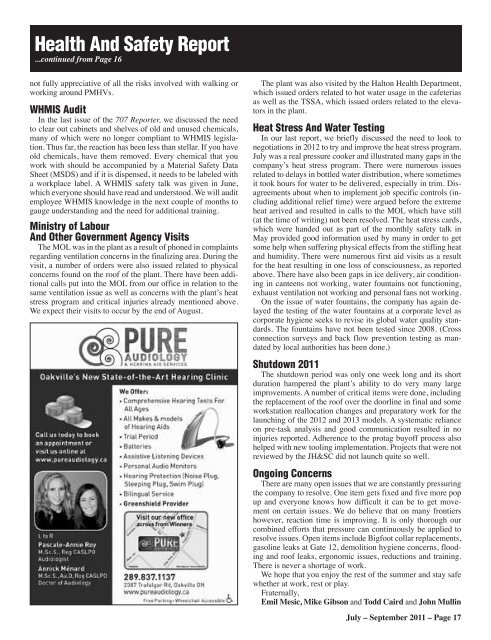seven-o-seven seven-o-seven REPORTER - CAW Local 707
seven-o-seven seven-o-seven REPORTER - CAW Local 707
seven-o-seven seven-o-seven REPORTER - CAW Local 707
You also want an ePaper? Increase the reach of your titles
YUMPU automatically turns print PDFs into web optimized ePapers that Google loves.
Health And Safety Report<br />
...continued from Page 16<br />
not fully appreciative of all the risks involved with walking or<br />
working around PMHVs.<br />
WHMIS Audit<br />
In the last issue of the <strong>707</strong> Reporter, we discussed the need<br />
to clear out cabinets and shelves of old and unused chemicals,<br />
many of which were no longer compliant to WHMIS legislation.<br />
Thus far, the reaction has been less than stellar. If you have<br />
old chemicals, have them removed. Every chemical that you<br />
work with should be accompanied by a Material Safety Data<br />
Sheet (MSDS) and if it is dispensed, it needs to be labeled with<br />
a workplace label. A WHMIS safety talk was given in June,<br />
which everyone should have read and understood. We will audit<br />
employee WHMIS knowledge in the next couple of months to<br />
gauge understanding and the need for additional training.<br />
Ministry of Labour<br />
And Other Government Agency Visits<br />
The MOL was in the plant as a result of phoned in complaints<br />
regarding ventilation concerns in the finalizing area. During the<br />
visit, a number of orders were also issued related to physical<br />
concerns found on the roof of the plant. There have been additional<br />
calls put into the MOL from our office in relation to the<br />
same ventilation issue as well as concerns with the plant’s heat<br />
stress program and critical injuries already mentioned above.<br />
We expect their visits to occur by the end of August.<br />
The plant was also visited by the Halton Health Department,<br />
which issued orders related to hot water usage in the cafeterias<br />
as well as the TSSA, which issued orders related to the elevators<br />
in the plant.<br />
Heat Stress And Water Testing<br />
In our last report, we briefly discussed the need to look to<br />
negotiations in 2012 to try and improve the heat stress program.<br />
July was a real pressure cooker and illustrated many gaps in the<br />
company’s heat stress program. There were numerous issues<br />
related to delays in bottled water distribution, where sometimes<br />
it took hours for water to be delivered, especially in trim. Disagreements<br />
about when to implement job specific controls (including<br />
additional relief time) were argued before the extreme<br />
heat arrived and resulted in calls to the MOL which have still<br />
(at the time of writing) not been resolved. The heat stress cards,<br />
which were handed out as part of the monthly safety talk in<br />
May provided good information used by many in order to get<br />
some help when suffering physical effects from the stifling heat<br />
and humidity. There were numerous first aid visits as a result<br />
for the heat resulting in one loss of consciousness, as reported<br />
above. There have also been gaps in ice delivery, air conditioning<br />
in canteens not working, water fountains not functioning,<br />
exhaust ventilation not working and personal fans not working.<br />
On the issue of water fountains, the company has again delayed<br />
the testing of the water fountains at a corporate level as<br />
corporate hygiene seeks to revise its global water quality standards.<br />
The fountains have not been tested since 2008. (Cross<br />
connection surveys and back flow prevention testing as mandated<br />
by local authorities has been done.)<br />
Shutdown 2011<br />
The shutdown period was only one week long and its short<br />
duration hampered the plant’s ability to do very many large<br />
improvements. A number of critical items were done, including<br />
the replacement of the roof over the doorline in final and some<br />
workstation reallocation changes and preparatory work for the<br />
launching of the 2012 and 2013 models. A systematic reliance<br />
on pre-task analysis and good communication resulted in no<br />
injuries reported. Adherence to the protag buyoff process also<br />
helped with new tooling implementation. Projects that were not<br />
reviewed by the JH&SC did not launch quite so well.<br />
Ongoing Concerns<br />
There are many open issues that we are constantly pressuring<br />
the company to resolve. One item gets fixed and five more pop<br />
up and everyone knows how difficult it can be to get movement<br />
on certain issues. We do believe that on many frontiers<br />
however, reaction time is improving. It is only thorough our<br />
combined efforts that pressure can continuously be applied to<br />
resolve issues. Open items include Bigfoot collar replacements,<br />
gasoline leaks at Gate 12, demolition hygiene concerns, flooding<br />
and roof leaks, ergonomic issues, reductions and training.<br />
There is never a shortage of work.<br />
We hope that you enjoy the rest of the summer and stay safe<br />
whether at work, rest or play.<br />
Fraternally,<br />
Emil Mesic, Mike Gibson and todd caird and John Mullin<br />
July – September 2011 – Page 17


